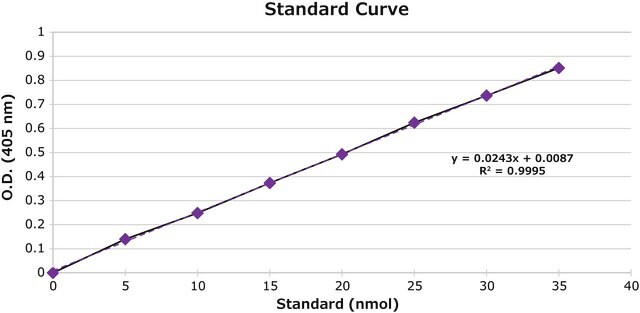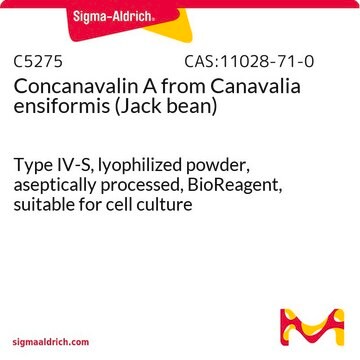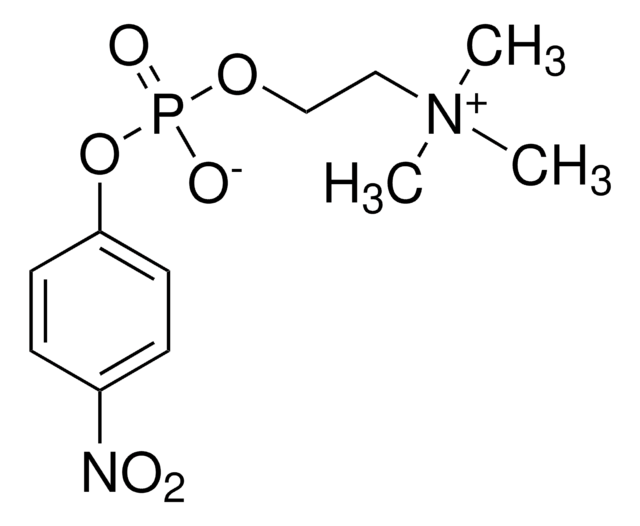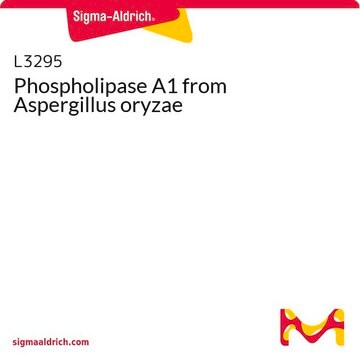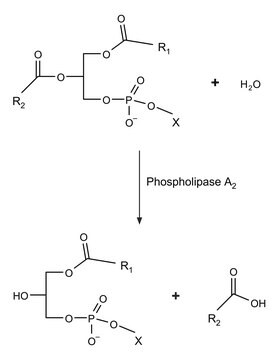P8804
Phospholipase C, Phosphatidylinositol-specific from Bacillus cereus
buffered aqueous glycerol solution, ≥1,000 units/mg protein (Lowry)
Synonym(s):
1-Phosphatidyl-D-myo-inositol inositol phosphohydrolase, cyclic-phosphate forming, PI-PLC
About This Item
Recommended Products
biological source
Bacillus sp. (Bacillus cereus)
Quality Level
form
buffered aqueous glycerol solution
specific activity
≥1,000 units/mg protein (Lowry)
mol wt
28 kDa
foreign activity
Phopholipase C (lecithinase) ≤1 units/mg protein
Sphingomyelinase ≤40 units/mg protein
storage temp.
2-8°C
Gene Information
Bacillus cereus E33L ... BCZK3513(3026815)
Looking for similar products? Visit Product Comparison Guide
General description
Application
- in the hydrolysis of substrates p-nitrophenylphosphorylcholine (p-NPPC) and p-nitrophenylphosphorylphosphate (p-NPP)
- to cleave glycosylphosphatidylinositol (GPI) anchor of lynx1 protein and its detachment from plasma membrane
- to cleave immunolabeled HeLa cells
Biochem/physiol Actions
Unit Definition
Physical form
Analysis Note
inhibitor
Storage Class Code
11 - Combustible Solids
WGK
WGK 3
Flash Point(F)
Not applicable
Flash Point(C)
Not applicable
Personal Protective Equipment
Regulatory Listings
Regulatory Listings are mainly provided for chemical products. Only limited information can be provided here for non-chemical products. No entry means none of the components are listed. It is the user’s obligation to ensure the safe and legal use of the product.
JAN Code
P8804-25UN-PW:
P8804-BULK:
P8804-VAR:
P8804-25UN:
P8804-5UN-PW:
P8804-5UN:
Choose from one of the most recent versions:
Certificates of Analysis (COA)
Don't see the Right Version?
If you require a particular version, you can look up a specific certificate by the Lot or Batch number.
Already Own This Product?
Find documentation for the products that you have recently purchased in the Document Library.
Customers Also Viewed
Articles
GPI Anchored Glycoproteins
Our team of scientists has experience in all areas of research including Life Science, Material Science, Chemical Synthesis, Chromatography, Analytical and many others.
Contact Technical Service

